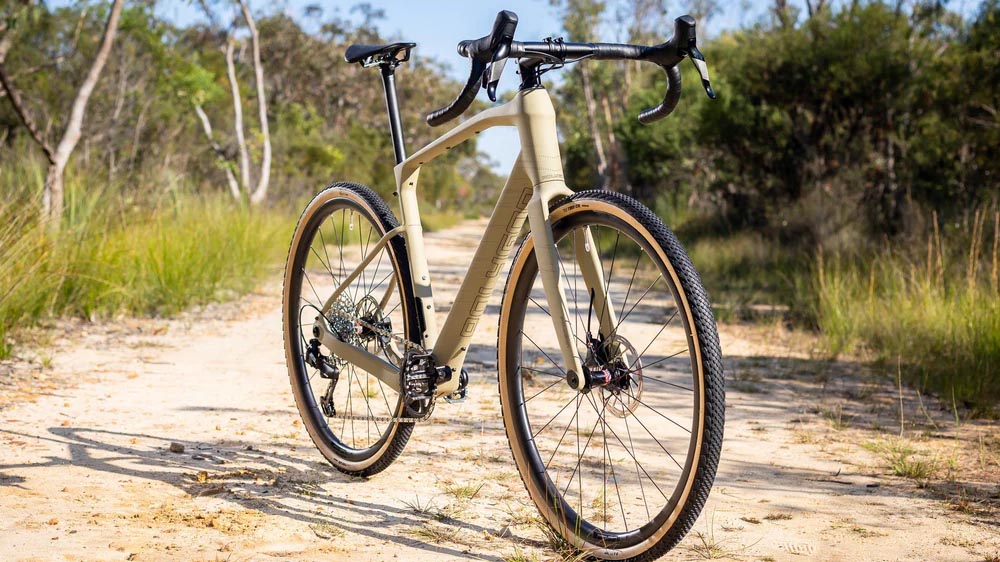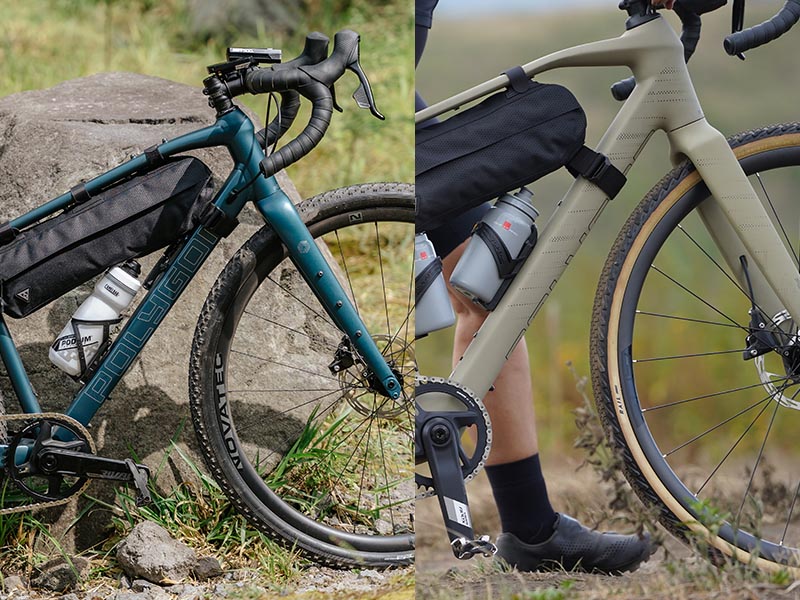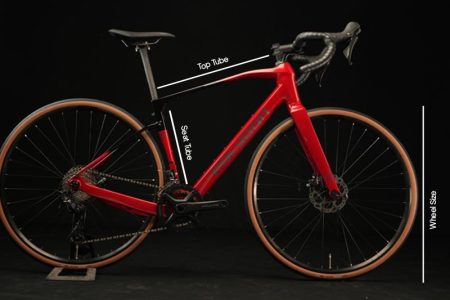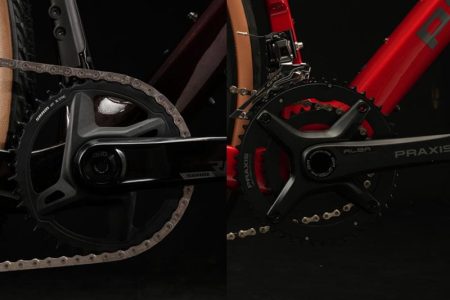Gravel biking has exploded in popularity, and for good reason. A gravel bike blends the speed of a road bicycle with the rugged versatility of a mountain bike, opening up a world of mixed-terrain adventures.
But before you hit the trails or plan that bikepacking weekend, there’s one key decision you’ll need to make: Which gravel bike frame should you choose: carbon or alloy?
Both materials have their strengths, and neither is strictly “better.” Instead, each suits different riding styles, needs, and budgets. In this guide, we’ll break down the differences between alloy and carbon gravel bikes in simple terms.
Whether you’re just getting into gravel or looking to upgrade, this article will help you choose the frame that fits your ride.
Is an Alloy Gravel Bike Frame Worth It?

If you’re new to gravel riding or planning long-distance adventures on a budget, an alloy gravel bike frame can be a smart choice. Alloy, often made from aluminum, is widely used in the cycling world for its balance of strength, affordability, and reliability.
Compared to carbon, alloy gravel bikes generally come at a lower price point, making them more accessible for beginners or riders who want to explore gravel without breaking the bank.
But it’s not just about cost; alloy gravel bikes tend to be more rugged, which makes them ideal for carrying extra gear like bikepacking bags, water bottles, or racks.
The material’s stiffness provides confidence when tackling rough roads or loaded climbs, giving riders peace of mind when durability matters most.
Pros and Cons of Alloy Gravel Bikes
Pros
- Robust and durable: Alloy gravel bike frames are tough. They can handle the demands of loaded touring, rough terrain, and day-to-day use without fuss. This durability makes them perfect for bikepacking or riders who aren’t afraid to get a little muddy.
- Budget-friendly: One of the biggest advantages of alloy is its price. An alloy gravel bicycle offers excellent value, often allowing riders to afford better components (like drivetrain or brakes) within the same budget compared to carbon models.
- Easier to repair: In the rare case your frame takes a hit, alloy is easier and more affordable to fix. This is especially helpful for riders traveling through remote areas where high-tech repair shops might not be around.
Cons
- Heavier than carbon: The biggest trade-off with alloy is weight. Alloy gravel bike frames are generally heavier than carbon ones. This might not matter on casual rides, but for racing or climbing-intensive routes, the extra grams can add up.
If you’re after a gravel bike that can haul gear, handle abuse, and keep your wallet happy, alloy makes a lot of sense. It’s the no-nonsense material that lets you focus on the adventure, not your budget.
Is a Carbon Gravel Bike Frame Worth It?

If you’re chasing speed, long-distance comfort, or just want a premium ride feel, a carbon gravel bike frame could be the upgrade you’re looking for.
Carbon fiber is known for its impressive strength-to-weight ratio and ability to smooth out harsh terrain, two qualities that matter when you’re riding for hours over mixed surfaces.
Unlike alloy, carbon allows engineers to fine-tune how the frame flexes. That means a carbon gravel bicycle can absorb road chatter and vibrations more effectively, resulting in a smoother, more comfortable ride, especially on rough gravel or washboard sections. For performance-focused riders or those sensitive to road feel, this can be a game-changer.
Pros and Cons of Carbon Gravel Bikes
Pros
- Lightweight and responsive: Carbon frames are significantly lighter than alloy ones, making climbs easier and acceleration quicker. If you plan to ride long distances, race, or simply want to go faster with less effort, carbon makes a real difference.
- Comfortable on rough terrain: The carbon’s natural vibration-damping properties help reduce fatigue over bumpy roads. This comfort boost can keep you riding longer and enjoying it more.
- Premium components and design: Most carbon gravel bikes are built with performance in mind. That often means better drivetrains, more precise shifting, lighter wheels, and advanced tech straight out of the box.
Cons
- Higher cost: Carbon gravel bike frames generally come with a steeper price tag. While they offer performance benefits, they may not be ideal for riders on a budget or those new to gravel.
- More difficult to repair: Carbon frames are strong, but when damaged, repairs can be complex and costly. The repairs often require specialists or full replacements.
If you prioritize speed, ride feel, and a lighter build, a carbon gravel bike frame is a worthy investment. Just be prepared to invest not only in the frame itself, but in maintenance, care, and proper storage to protect your ride.
Which Gravel Bike Frame Should You Choose: Alloy or Carbon?
There’s no one-size-fits-all answer, because it depends on how and where you ride. If you’re planning bikepacking trips, commuting over unpredictable roads, or just want a solid all-rounder at a reasonable price, an alloy gravel bike offers great value.
It’s tough, dependable, and easy to maintain, ideal for beginners or riders who carry more gear than grams.
But if your focus is performance, a carbon gravel bike frame delivers on comfort and speed. It’s built for riders who want a refined ride experience and are willing to invest a little more upfront.
Polygon’s Take: Choose What Fits Your Ride, Not the Hype
At Polygon, we believe the best gravel bike frame isn’t the most expensive; it’s the one that fits your lifestyle. Think about how you ride. Are you commuting daily, tackling weekend trails, or planning long adventures?
Do you prefer low-maintenance gear or enjoy tuning your setup? And what’s your budget? Are you investing long-term, or starting with something sturdy and reliable?
Both alloy and carbon have their strengths. What matters most is that your bike supports the way you ride, comfortably, confidently, and often. Choose the frame that fits your journey, not the trend.
Read also
- Smart Gravel Bike Maintenance Tips
- 5 Gravel Bike Hacks for Epic Adventures
- First-Time Gravel Bikepacking Tips
Conclusion
Choosing between an alloy or carbon gravel bike frame is a big decision, but it doesn’t have to be overwhelming. Alloy offers durability and value. Carbon offers performance and comfort. Neither is wrong.
The key is understanding what kind of rider you are today, and what kind of adventures you want tomorrow.
At Polygon, we design both alloy and carbon gravel bicycles to help you go further, whether you’re just starting your gravel journey or already chasing KOMs. Because the right frame isn’t just about material, it’s about making sure every ride feels like the right one.













